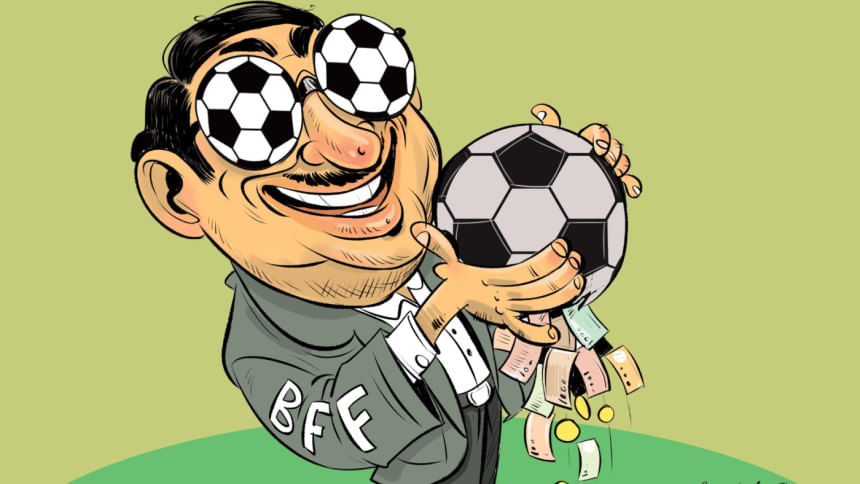The Bangladesh Football Federation (BFF) has long displayed a knack for committing faux pas. During the previous tenure under Kazi Salahuddin, the country's football governing body frequently reduced itself to a national laughing stock through unprofessional conduct and a glaring lack of leadership.
Hopes had been high for the new committee, led by industrialist-turned-politician Tabith Awal, sworn in just over a year ago. Early signs were promising: the women's national team scaled unprecedented heights and the men's side generated fresh enthusiasm with the arrival of several high-profile overseas-based players.
Yet it appears that the second-most affluent sporting body in the country cannot shed its old habit of turning itself into a punchline. The latest fiasco, involving Malaysian multinational oil and gas giant Petronas, has now earned the BFF international embarrassment.
After running the Bangladesh Football League (BFL) -- formerly the Bangladesh Premier League -- for two months without a title sponsor, the BFF on Sunday unveiled a new league logo prominently featuring the Petronas insignia.
When asked about the sponsorship arrangement, BFF vice-president and marketing committee chairman Fahad Karim told The Daily Star:
"We signed the deal (with United Group, the authorised distributors of Petronas products in Bangladesh) over two months ago. But United Group took some time deciding which of their products would front the league, which is why the announcement was delayed."
The low-key nature of the announcement immediately drew suspicion, but the real shock came the following morning when Petronas issued a statement flatly denying any involvement.
"PETRONAS has become aware of recent social media postings regarding an alleged title sponsorship of the Bangladesh Football League. We wish to confirm that PETRONAS has not entered into any sponsorship agreement for the Bangladesh Football League, nor have we authorised the use of our name or brand in connection with this league. PETRONAS takes the integrity of our brand seriously and remains focused on delivering value to our stakeholders and communities where we operate," the release stated.
The news spread rapidly across East Asian media, subjecting the already fragile credibility of the BFL -- and the BFF behind it -- to intense scrutiny.
Red flags had already appeared on Saturday when a draft BFL logo emerged on social media, bearing an uncanny resemblance to two existing logos: a health-and-fitness app and the emblem of top-tier Australian football league. That leak triggered a wave of memes, with netizens deriding the BFF's questionable design choices and apparent frivolity.
For those familiar with the federation's dubious modus operandi, none of this is surprising. Alongside a handful of respectable deals, the new marketing committee has repeatedly struck partnerships with obscure companies, prompting questions over who truly benefits from such arrangements.
Worse still, rather than addressing the Petronas debacle transparently -- an embarrassment that could even invite legal repercussions -- the federation appears intent on sweeping it under the carpet. After multiple requests for clarification, the BFF issued a press release claiming that United Health Care, a United Group subsidiary, had been confirmed as the league's title sponsor. It further asserted that "Petronas announced that it would not be able to participate as title sponsor for this season" -- a claim that is decidedly inconsistent with Petronas's categorical denial.
When contacted, Arif Hoque, the United Group's head of PR and Business Development, confirmed that United Health Care would indeed assume the title sponsorship, attributing the situation to a 'miscommunication'.
But when pressed on which party was responsible for the mix-up -- and what motive may have led to the premature branding of a substandard domestic league with the name of a global corporation -- he could offer no meaningful explanation.

